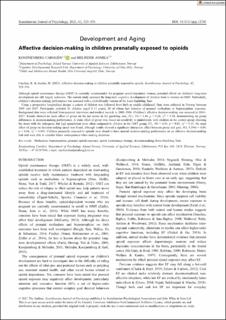| dc.contributor.author | Carolien, Konijnenberg | |
| dc.contributor.author | Annika, Melinder | |
| dc.date.accessioned | 2022-11-10T09:21:34Z | |
| dc.date.available | 2022-11-10T09:21:34Z | |
| dc.date.created | 2021-05-26T13:45:28Z | |
| dc.date.issued | 2021 | |
| dc.identifier.citation | Scandinavian Journal of Psychology. 2021, 62 (4), 529-536. | en_US |
| dc.identifier.issn | 0036-5564 | |
| dc.identifier.uri | https://hdl.handle.net/11250/3031085 | |
| dc.description.abstract | Although opioid maintenance therapy (OMT) is currently recommended for pregnant opioid-dependent women, potential effects on children’s long-term development are still largely unknown. The current study assessed the long-term cognitive development of children born to women in OMT. Particularly, children’s decision-making performance was assessed with a child-friendly version of the Iowa Gambling Task. Using a prospective longitudinal design, a cohort of children was followed from birth to middle childhood. Data were collected in Norway between 2005 and 2017. Participants included 41 children (aged 9–11 years), 20 of whom had histories of prenatal methadone or buprenorphine exposure. Background data were collected from personal interviews and medical records in 2005–2006. Children’s affective decision-making was assessed in 2016– 2017. Results showed no main effect of group on the net scores in the gambling task, F(1, 39) = 1.44, p = 0.24, g2 = 0.04, demonstrating no group differences in decision-making performance. A main effect of group was found on sensitivity to punishment, with children in the control group choosing the doors with the infrequent, but high punishment more often compared to children in the OMT group, F(1, 39) = 4.90, p = 0.03, g2 = 0.11. No main effect of group on decision-making speed was found, although results showed a significant interaction effect between group and gain, F(1, 8,194) = 4.09, p = 0.04, g2 = 0.001. Children prenatally exposed to opioids were found to have normal decision-making performance on an affective decision-making task and were able to consider future consequences when making decisions. | en_US |
| dc.language.iso | eng | en_US |
| dc.rights | Attribution-NonCommercial-NoDerivatives 4.0 Internasjonal | * |
| dc.rights.uri | http://creativecommons.org/licenses/by-nc-nd/4.0/deed.no | * |
| dc.subject | Methadone, buprenorphine, prenatal opioid exposure, opioid maintenance therapy, decision-making, Iowa Gambling Task | en_US |
| dc.subject | Methadone | en_US |
| dc.subject | buprenorphine | en_US |
| dc.subject | prenatal opioid exposure | en_US |
| dc.subject | opioid maintenance therapy | en_US |
| dc.subject | decision-making | en_US |
| dc.subject | Iowa Gambling Task | en_US |
| dc.title | Affective decision-making in children prenatally exposed to opioids | en_US |
| dc.type | Peer reviewed | en_US |
| dc.type | Journal article | en_US |
| dc.description.version | publishedVersion | en_US |
| dc.subject.nsi | VDP::Samfunnsvitenskap: 200 | en_US |
| dc.source.pagenumber | 529-536 | en_US |
| dc.source.volume | 62 | en_US |
| dc.source.journal | Scandinavian Journal of Psychology | en_US |
| dc.source.issue | 4 | en_US |
| dc.identifier.doi | 10.1111/sjop.12743 | |
| dc.identifier.cristin | 1911989 | |
| cristin.ispublished | true | |
| cristin.fulltext | original | |
| cristin.qualitycode | 1 | |

